Pollito's Manifest on Java Spring Boot Contract-Driven Development for microservices 2
Posted on March 18, 2024 • 10 minutes • 2067 words • Other languages: Español
This is a continuation of Pollito’s Manifest on Java Spring Boot Contract-Driven Development for microservices 1 .
openapi-generator-maven-plugin
Before getting into technical talk, let me introduce the main component that will help to embrace the Compontent-Driven Development practices: the dependency org.openapitools » openapi-generator-maven-plugin » 7.4.0 .
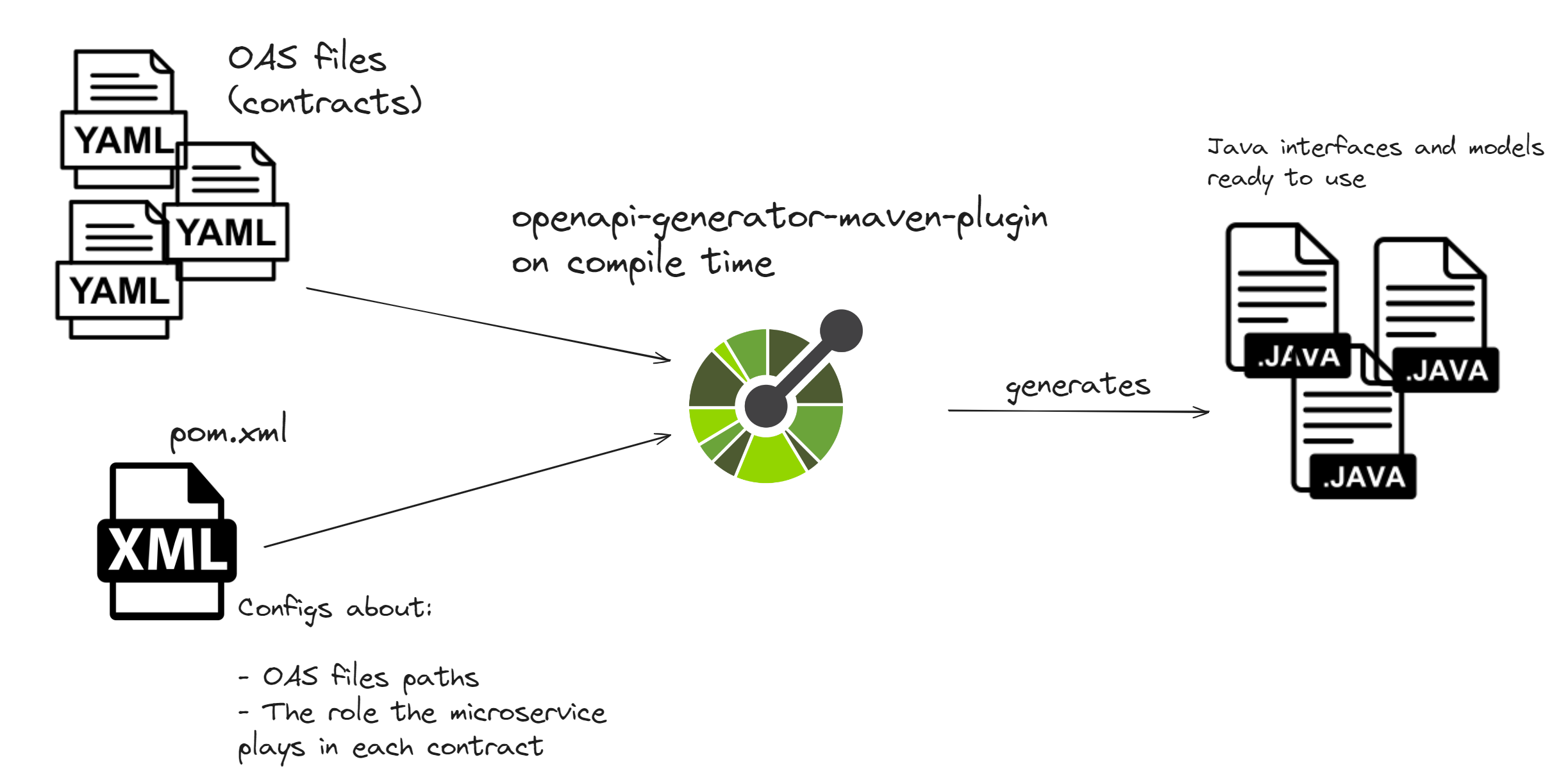
It is a powerful Maven plugin for Java projects that automates the generation of API client libraries, server stubs, and documentation from OAS files.
springBootStarterTemplate
springBootStarterTemplate is a starting point for future projects, designed to embrace Component-Driven Development (CDD) practices. It encapsulates essential dependencies and best-practice boilerplates.
It has three branches:
- main
: Satisfies
- “A microservice complies at least with one contract, playing the provider role.”
- The zero scenario of “A microservice can play the consumer role in zero, one, or many contracts.”
- feature/provider-gen-example : An example implementation of main
- feature/consumer-gen-example
: An extension of feature/provider-gen-example, which satisfies everything stated in main plus
- The one or many scenarios of “A microservice can play the consumer role in zero, one, or many contracts.”
springBootStarterTemplate -> feature/provider-gen
Let’s do a run of each relevant file content.
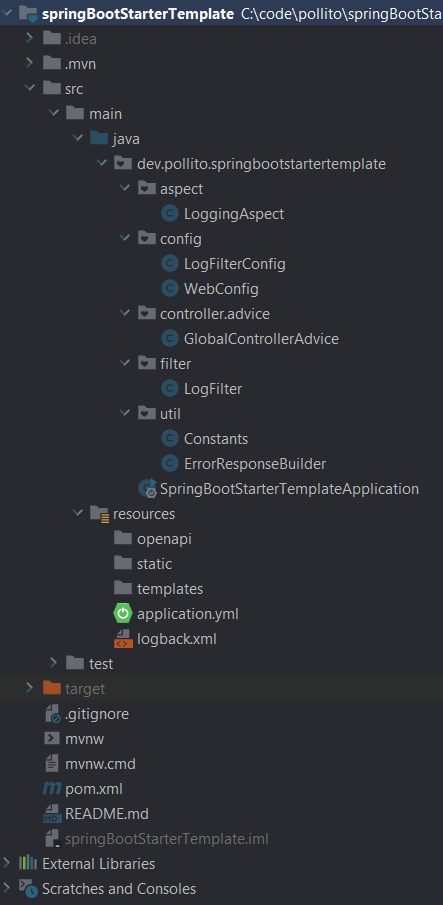
aspect.LoggingAspect
Centralized logging logic across the application, particularly for controller methods.
config.LogFilterConfig
Configuration class in a Spring Boot application, dedicated to setting up a custom filter, specifically filter.LogFilter.
By default, it ensures that LogFilter is applied globally to all requests.
config.WebConfig
Configuration class focusing on Cross-Origin Resource Sharing (CORS) settings .
By default, it allows cross-origin requests from any source, which is good for dev purposes. However this might not be suitable for a production environment.
controller.advice.GlobalControllerAdvice
Global exception handler designed to catch and handle various exceptions that may occur during the processing of web requests.
By default, it handles:
- MissingServletRequestParameterException: Caught when required request parameters are missing.
- ConstraintViolationException: Handled when Bean Validation API constraint violations occur.
- MethodArgumentTypeMismatchException: Caught when a method argument is not the expected type.
- MethodArgumentNotValidException: Handled when an argument annotated with @Valid fails validation.
- Exception: A generic catch-all for any other exceptions not explicitly handled by the other methods.
Each handler method returns a ResponseEntity<Error>, where Error is meant to be a schema in your provider OAS file.
By default also contains the annotation @Order() empty with no args. This means that the advice runs last in relation to other @ControllerAdvice components.
filter.LogFilter
It implements a servlet filter for logging request and response details.
- It initializes the Mapped Diagnostic Context (MDC) with a unique session ID for each request, facilitating easier tracing of logs related to specific requests.
- It logs details about the incoming request, including its method, URI, query string, and headers.
- After the request has been processed, it also logs the response status.
util.Constants
Container for application-wide constants.
By default it only contains the constant SLF4J_MDC_SESSION_ID_KEY, used in LogFilter as a key in the SLF4J Mapped Diagnostic Context (MDC) for storing and retrieving a unique session identifier.
Feel free to add all your needed constants here.
util.ErrorResponseBuilder
Utility for constructing error response entities, so all error responses have the same structure.
SpringBootStarterTemplateApplication
Default entry point to a Spring Boot application.
resources > openapi files
This is a totally arbitrary folder inside resources where I decided is good enough to put all the OAS files.
Is important to remember that in the definition of contract I made up, we need to comply with inputs, outputs, and errors.
Microservices must comply with a contract, which defines inputs, outputs, and errors.
So, each contract should have an Error-like schema (no need for it to be named Error), which after generation tasks, will be used for constructing standardized error responses.
Here is my recommended Error schema:
Error:
type: object
properties:
timestamp:
type: string
description: The date and time when the error occurred in ISO 8601 format.
format: date-time
example: "2024-01-04T15:30:00Z"
session:
type: string
format: uuid
description: A unique UUID for the session instance where the error happened, useful for tracking and debugging purposes.
error:
type: string
description: A brief error message or identifier.
message:
type: string
description: A detailed error message.
path:
type: string
description: The path that resulted in the error.
Feel free to organize files in subfolders if necessary. Don’t forget to maintain consistency in the pom.xml (more on that later).
resources > logback.xml
Configuration to log information to the console, with a customized pattern that includes a session ID for better traceability of log entries.
pom.xml
-
This template uses Spring Boot 3.2.3 and Java 21
-
Basic dependencies: you’ll find these in almost every Spring Boot 3 application out there:
- org.springframework.boot » spring-boot-starter-web » 3.2.3 : Essential for building web applications using Spring Boot
- org.springframework.boot » spring-boot-devtools » 3.2.3 : Set of tools that make the development process with Spring Boot more efficient.
- org.springframework.boot » spring-boot-configuration-processor » 3.2.3 : Generates metadata for configuration properties, making them easier to work with in IDEs.
- org.projectlombok » lombok » 1.18.30 : Reduces boilerplate code like getters, setters, and constructors through annotations.
- org.springframework.boot » spring-boot-starter-test » 3.2.3 : Includes support for JUnit, Spring Test & Spring Boot Test, AssertJ, Hamcrest, and a bunch of other libraries necessary for thorough testing.
-
AOP:
- org.aspectj » aspectjweaver » 1.9.21.2 : Modifies Java classes to weave in the aspects.
-
Mapping:
- org.mapstruct » mapstruct » 1.5.5.Final : Mappings between Java bean types based on a convention over configuration approach. There are many mappers out there , is a pick your own poison situation.
-
Dependencies required by org.openapitools » openapi-generator-maven-plugin » 7.4.0 when generating provider code:
- io.swagger.core.v3 » swagger-core-jakarta » 2.2.20 : Solves error package io.swagger.v3.oas.annotations does not exist.
- org.openapitools » jackson-databind-nullable » 0.2.6 : Solves error package org.openapitools.jackson.nullable does not exist.
- org.springframework.boot » spring-boot-starter-validation » 3.2.3 : Solves validations being ignored.
-
Plugins:
- org.springframework.boot » spring-boot-maven-plugin » 3.2.3 : Used for explicitly excluding lombok from the final packaged application, since Lombok is a compile-time only tool that helps reduce boilerplate code.
- org.apache.maven.plugins » maven-compiler-plugin » 3.12.1 : Compiles the sources of your project.
- org.mapstruct » mapstruct-processor » 1.5.5.Final : Needed to make mapstruct and lombok coexist
- org.projectlombok » lombok-mapstruct-binding » 0.2.0 : Needed to make mapstruct and lombok coexist.
- com.spotify.fmt » fmt-maven-plugin » 2.23 : Formats your Java source code to comply with Google Java Format .
- org.openapitools » openapi-generator-maven-plugin » 7.4.0 : A Maven plugin to support the OpenAPI generator project. Is a code generator that embraces CDD practices.
This is an example of how to configure it for provider generation:
<plugin>
<groupId>org.openapitools</groupId>
<artifactId>openapi-generator-maven-plugin</artifactId>
<version>7.2.0</version>
<executions>
<execution>
<id>provider generation - your OAS file</id>
<goals>
<goal>generate</goal>
</goals>
<configuration>
<inputSpec>${project.basedir}/src/main/resources/openapi/your OAS file</inputSpec>
<generatorName>spring</generatorName>
<output>${project.build.directory}/generated-sources/openapi/</output>
<apiPackage>dev.pollito.springbootstartertemplate.api</apiPackage>
<modelPackage>dev.pollito.springbootstartertemplate.models</modelPackage>
<configOptions>
<interfaceOnly>true</interfaceOnly>
<useSpringBoot3>true</useSpringBoot3>
<useEnumCaseInsensitive>true</useEnumCaseInsensitive>
</configOptions>
</configuration>
</execution>
</executions>
</plugin>
Let’s check what’s going on here.
- Group ID and Artifact ID: Identifies the OpenAPI Generator plugin itself.
- Version: Specifies the version of the OpenAPI Generator plugin.
- Execution block: Defines when and how the plugin’s goal(s) should be executed within the build lifecycle.
- ID: A unique identifier for this execution instance.
- Goals: Specifies the generate goal, which tells the plugin to perform code generation.
- Configuration Block: Provides detailed instructions on how the code generation should be performed.
- inputSpec: Points to the location of the OpenAPI spec file that does the role of being the provider contract.
- generatorName: Specifies the spring generator, indicating that the code should be generated with Spring in mind, tailoring the output for Spring-based projects.
- output: The directory where the generated code should be placed. Personally I think target/generated-sources/openapi/ directory is a good place.
- apiPackage and modelPackage: Define the Java package names for the generated API interfaces and model classes, respectively. These values are up to you. Personally I like to use the OAS file server url in reverse url notation. In case that info is not available, using the project groupId + artifactId is common practice
- configOptions: A set of additional configuration options.
- interfaceOnly: It set to true. You will need to create your own implementation anyways.
- useSpringBoot3: Ensures compatibility with Spring Boot 3.
- useEnumCaseInsensitive: If there are generated enums, it is configured to be case-insensitive, adding flexibility to how their values are deserialized.
UML diagram
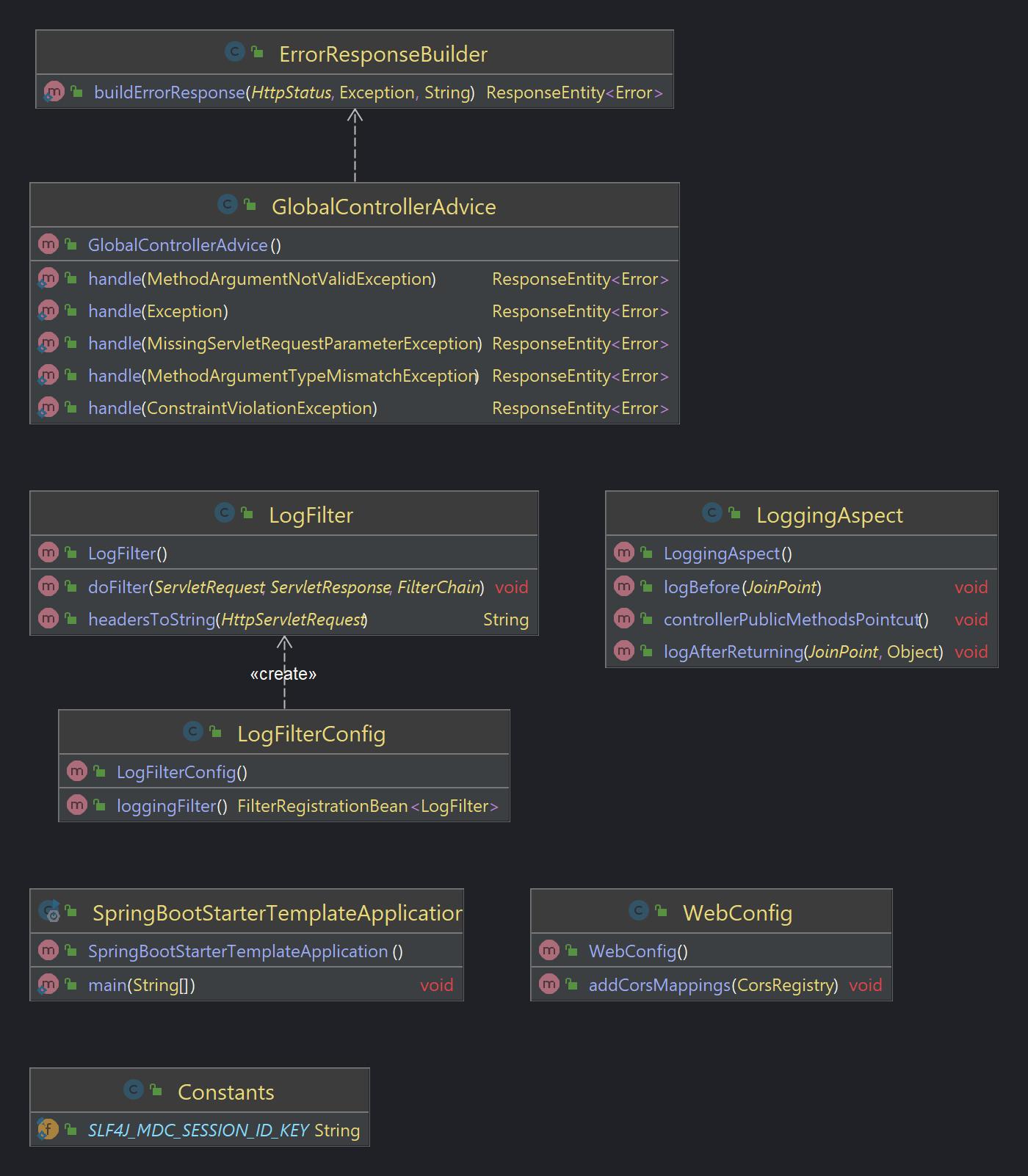
How to use this template
- Clone the repo and remove its relationship to the original repository.
- Optional but recommended give it your own identity to the repo.
- Add a OAS file in resources/openapi.
- Be sure your OAS have the recommended Error schema.
- If the schema is named diferent than Error, the code won’t compile, and you’ll need to change some imports as indicated by the compiler. Is not a big deal.
- In pom.xml, uncomment the block code related to openapi-generator-maven-plugin.
- Edit the block code so it points to your recently added OAS file in resources/api.
- Here you can also edit apiPackage and modelPackage tags. Again, the code won’t compile, and you’ll need to change some imports as indicated by the compiler. Is not a big deal x2.
- maven clean + maven compile.
- Create a @RestController and implement the generated interface.
- Run the application.
Implementation example
You can find this code in feature/provider-gen-example
0. Clone the repo and remove its relationship to the original repository.
Follow these steps
git clone https://github.com/franBec/springBootStarterTemplate.git
cd springBootStarterTemplate
rm -rf .git
git init
Now you have a totally new clean repo.
Optional but recommended give it your own identity to the repo. For this:
- Modify the groupId and artifactId in the pom.xml
- Refactor Your Package Structure to match the new groupId: This can usually be done easily within an IDE like IntelliJ IDEA or Eclipse by right-clicking on the package and choosing Refactor -> Rename.
1. Add a OAS file in resources/openapi
For this, I will yoink the petstore example from The OpenAPI Specification github .
Don’t forget to add (or in this case replace the already existing) Error schema in the OAS with the recommended Error schema from this blog.
2. In pom.xml, uncomment the block code related to openapi-generator-maven-plugin
This is easy, just delete the <— —> that surround the block code
3. Edit the block code so it points to your recently added OAS file in resources/api
Here it how it looks after editing:
<plugin>
<groupId>org.openapitools</groupId>
<artifactId>openapi-generator-maven-plugin</artifactId>
<version>7.2.0</version>
<executions>
<execution>
<id>provider generation - petstore.yaml</id>
<goals>
<goal>generate</goal>
</goals>
<configuration>
<inputSpec>${project.basedir}/src/main/resources/openapi/petstore.yaml</inputSpec>
<generatorName>spring</generatorName>
<output>${project.build.directory}/generated-sources/openapi/</output>
<apiPackage>io.swagger.petstore.api</apiPackage>
<modelPackage>io.swagger.petstore.models</modelPackage>
<configOptions>
<interfaceOnly>true</interfaceOnly>
<useSpringBoot3>true</useSpringBoot3>
<useEnumCaseInsensitive>true</useEnumCaseInsensitive>
</configOptions>
</configuration>
</execution>
</executions>
</plugin>
I edited the apiPackage and modelPackage tag values, so I get the compilation error and show how to fix.
4. maven clean + maven compile
As stated, we get package dev.pollito.springbootstartertemplate.models does not exist
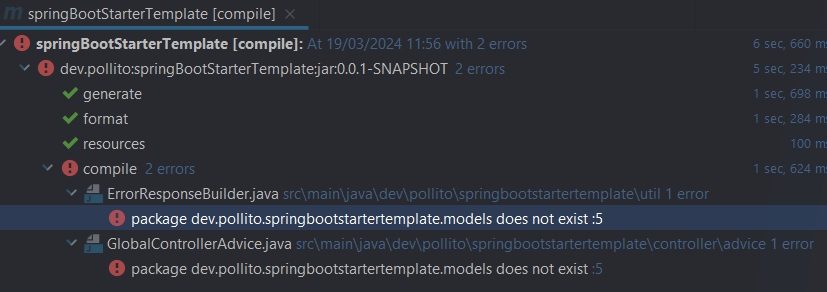
Let’s fix this. In each file, change the broken import. Be sure to import the one that was generated by the plugin. Error is a very common name, you could import the wrong one.
In this case, the one we need is the second one, from io.swagger.petstore.models

After fixing the imports, try compiling again. We should be good to go.
5. Create a @RestController and implement the generated interface.
I like to mantain a cohesion between the name the interface was given when generated, and my controller class name. So, let’s look in the generated-sources which name the interface was given on generation.
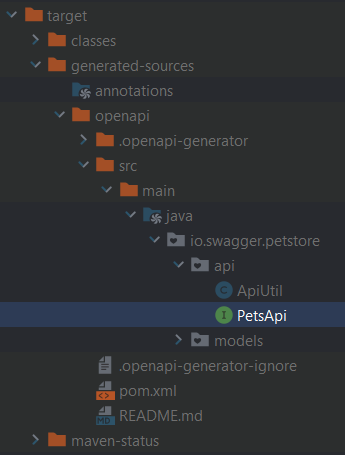
There we can see, it was called PetsApi, so let´s create PetsController:
- Create it in the controller package (beware not to put it inside the advice package by accident).
- Give it the @RestController annotation
- Make it implement PetsApi.
@RestController
public class PetsController implements PetsApi {
}
In intelliJ IDEA, if you press Ctrl+O inside a class that implements something, you’ll get a pop up asking you which interface methods you want to override/implement.
Here select everything you need. Usually you won’t need anything from java.lang.Object, and also you won’t need the one method that returns Optional NativeWebRequest.
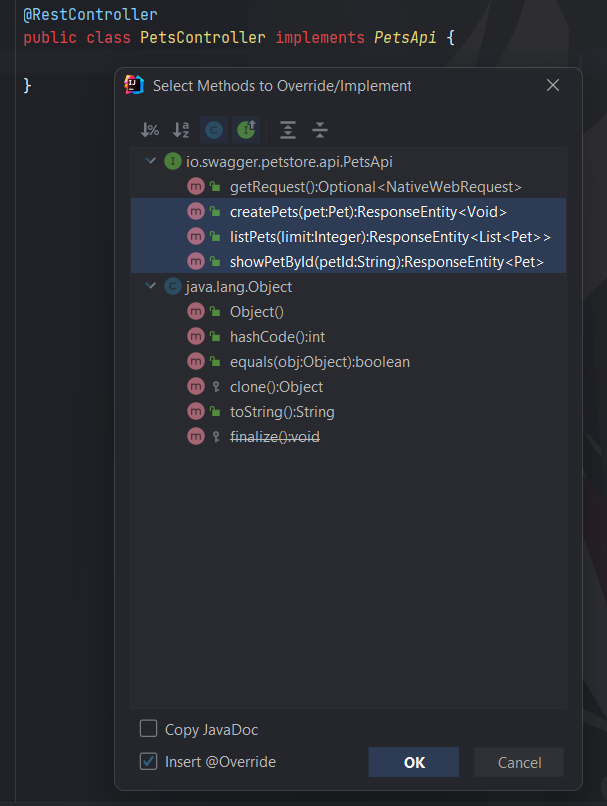
Now we have all this code:
@RestController
public class PetsController implements PetsApi {
@Override
public ResponseEntity<Void> createPets(Pet pet) {
return PetsApi.super.createPets(pet);
}
@Override
public ResponseEntity<List<Pet>> listPets(Integer limit) {
return PetsApi.super.listPets(limit);
}
@Override
public ResponseEntity<Pet> showPetById(String petId) {
return PetsApi.super.showPetById(petId);
}
}
6. Run the application
Try this request:
curl --location 'http://localhost:8080/pets'
You’ll receive an empty body with a 501 Not Implemented status.
And the logs show the following information:
2024-03-19 12:20:04 INFO d.p.s.filter.LogFilter [SessionID: 433cd727-56f4-4236-9cf7-04434f54c7c4] - >>>> Method: GET; URI: /pets; QueryString: null; Headers: {user-agent: PostmanRuntime/7.37.0, accept: */*, cache-control: no-cache, postman-token: 3c483439-921c-48d5-ab28-a85d76fce2e8, host: localhost:8080, accept-encoding: gzip, deflate, br, connection: keep-alive}
2024-03-19 12:20:04 INFO d.p.s.aspect.LoggingAspect [SessionID: 433cd727-56f4-4236-9cf7-04434f54c7c4] - [PetsController.listPets(..)] Args: [null]
2024-03-19 12:20:05 INFO d.p.s.aspect.LoggingAspect [SessionID: 433cd727-56f4-4236-9cf7-04434f54c7c4] - [PetsController.listPets(..)] Response: <501 NOT_IMPLEMENTED Not Implemented,[]>
2024-03-19 12:20:05 INFO d.p.s.filter.LogFilter [SessionID: 433cd727-56f4-4236-9cf7-04434f54c7c4] - <<<< Response Status: 501
Next lecture
Pollito’s Manifest on Java Spring Boot Contract-Driven Development for microservices 3

